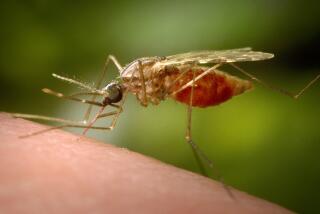Possibility of Infectious Diseases Poses Serious Threat to U.S. Troops : Medicine: Doctors foresee a challenge but they say that the problem should be less severe than in Vietnam.
WASHINGTON — The possibility of contracting infectious diseases is a serious threat to U.S. troops in the Middle East, according to military and Veterans Administration physicians.
Many of the 400,000 American troops deployed in the Persian Gulf region are likely to come down with diseases--mostly mundane but some exotic--that are found in the region.
With the outbreak of war, the toll from disease will undoubtedly be higher as health precautions take a back seat to the battle, medical authorities say.
Experts say the good news is that the overall impact of parasitic and other diseases--carried mostly by mosquitoes, worms, flies and fleas--in Saudi Arabia will probably be much less than it was on the 550,000 Americans who served in Vietnam.
“Saudi Arabia is drastically different from the wet areas in Southeast Asia,” said Gary Roselle, chief of medicine at the Veterans Hospital in Cincinnati, who has taken the lead in preparing veterans hospitals as reserve facilities for casualties from the gulf. “The difference between a tropical desert and a tropical jungle is very great.”
In addition, drug use in the U.S. military now is “minuscule compared to Vietnam,” said Pitt Tomlinson, a physician in the U.S. surgeon general’s office of disease control.
As a result, the incidence of hepatitis B, which traditionally is transmitted by dirty needles, is expected to be almost non-existent--unless there is a resurgence of drug abuse during the gulf deployment, military experts say.
This wouldn’t be the first time that disease has served as a decisive factor in war. Historically, one medical expert said, “infections have debilitated more soldiers and kept them from fighting than actual battle.”
Aside from the physical toll, tales of armies that were defeated by disease rather than by the enemy stretch back to the Middle Ages, when the forces of France’s King Henry V were beaten by marsh fever. During World War II, malaria ravaged Allied forces in the Pacific.
Closer to the Middle East, the North African army of German Field Marshal Erwin Rommel, “the Desert Fox,” was decimated by hepatitis and other diseases. In 1942, for every German soldier evacuated from North Africa for combat wounds, three were evacuated for disease, according to a report compiled by Walter Reed Army Hospital here. Disease contributed greatly to Rommel’s defeat at El Alamein and elsewhere.
And in 1958, half of the American troops sent to Lebanon came down with diarrhea, and 5% of the victims had to be hospitalized, according to the Walter Reed Hospital report.
So far, American GIs in Saudi Arabia have suffered relatively few illnesses, although some have already been evacuated from the region.
“All in all, we’ve been very successful from a public health standpoint--but things can change,” Tomlinson said.
Some physicians familiar with the situation credit the good health of the troops so far primarily to the fact that the armed forces are importing virtually all food and water, including sealed ready-to-eat meals.
But as the size of the force increases, more and more of these supplies will be purchased locally, raising significantly the risk of infection from contaminated food and water.
With time, too, more of the troops will take rest and recreation leaves in the area, increasing their exposure to local populations and their diseases.
Beds in military hospitals have fallen from 500,000 after World War II to 57,000 after Vietnam to only 16,000 now, officials said. This has required the mobilization of both VA and civilian hospitals to help treat potential casualties from the gulf.
What is more, U.S. troops will be vulnerable to a variety of illnesses that occur naturally in the region, from diarrhea to anthrax (an infectious disease from animals) to botulism, which often can be so lethal that they are among the standard weapons stored in the world’s biological warfare arsenals.
Diarrhea and dysentery can be particularly virulent and debilitating. Even in Cairo, the most Westernized metropolis of the Arab world, Western residents wash their lettuce in a chlorine solution to kill any organisms on the feces-fertilized vegetable.
The effect of acute diarrhea on U.S. troops could be seriously exacerbated, and even life-threatening, if soldiers are forced to don the hot, cumbersome suits required to protect them against chemical and biological weapons.
In such cases, dehydration would become an acute problem. The incidence of diarrhea and dysentery among U.S. service personnel in the gulf is already about 4,000 cases a week, according to Army physicians.
There are other problems peculiar to the region. During January and February, desert winds that continually blow the fine, sandy dust about can induce pneumonia. Many local diseases are transmitted by sand fleas, which are widespread.
Some of these illnesses are relatively benign, such as a flu-type fever that lasts up to a week. But others, including several forms of parasite-caused leishmaniasis, are more serious. One type causes skin ulcers that can leave disfiguring scars. Another invades internal organs such as the liver and can cause death. Six or seven leishmaniasis cases have already occurred.
Sand fleas carry a variety of diseases, including the plague (much as they did in Vietnam). But proper clothing with tight sleeves and use of insect repellents are usually effective, doctors say.
Worms, both hook and round varieties, are also potential problems, although seldom fatal.
Most worms enter the body in food but some can bore through the skin, so soldiers are told not to go barefoot in the sand. They are also told to avoid wading in any fresh water they might find, lest a snail-carried parasite infect them.
Malaria, carried by mosquitoes, is another potential difficulty for the troops. It is usually too hot in most of Saudi Arabia for mosquitoes, but the insects thrive in marshy Iraq and infected Iraqis have presumably brought the disease with them to Kuwait, where it could hit Americans retaking that country in battle.
U.S. forces are given anti-malaria drugs while in the region and a second type on their return home. But physicians have found that some drugs in the second group can have adverse side effects, breaking down red blood cells in certain people.
“If we’re careful, it’s no big deal,” one physician said. “We just have to be careful.”
Cincinnati’s Roselle said that authorities do not expect to see many unusual or exotic infections. But other physicians said that some frightening diseases are considered endemic to the region, including cholera, typhoid, hepatitis and Nile fever, and the even more worrisome biological warfare organisms such as anthrax, botulism, Q-fever and bubonic plague.
And lurking in the background is the possibility that U.S. physicians have not even seen many of these diseases before and might not be able to diagnose or treat them easily.
“We’ve learned a lot from the previous wars,” one doctor said, “but we also have always been surprised.”
DESERT AILMENTS
So far, American GIs in Saudi Arabia have suffered relatively few illnesses. Here are some conditions or diseases experts say could arise:
Dehydration
Dysentery
Diarrhea
Pneumonia
Parasite-caused leishmaniasis. Can cause skin ulcers or invade internal organs
Plague, carried by fleas
Hookworms, roundworms
Malaria
Cholera
Typhoid
Nile fever
More to Read
Sign up for Essential California
The most important California stories and recommendations in your inbox every morning.
You may occasionally receive promotional content from the Los Angeles Times.










